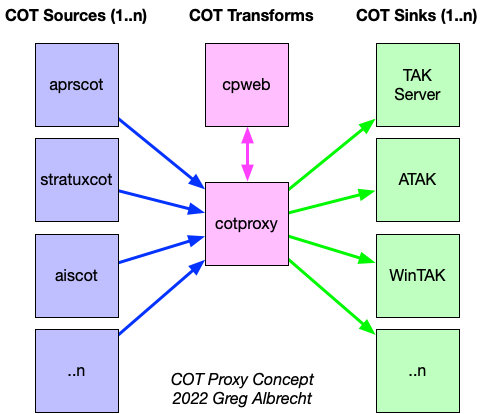
COTProxy is an in-line Cursor-on-Target (CoT) transformation proxy for TAK Products. CoT can be modified as it travels from one TAK Product to another over a network.
Given a matching UID & Transform, CoT Event characteristics can be changed, including Callsign, Type, Icon, Video, et al. COTProxy's transform configurations are managed via the COTProxyWeb front-end, installed separately.
Concept of Operations CONOPS:

Help: Email takhelp@undef.net or Signal/WhatsApp: +1-310-621-9598
This project has been developed for the Disaster Response, Public Safety and Frontline Healthcare community. All contributions further project development and ensure ongoing support.

COTProxy can be configured using an INI-style config file, or using Environment Variables. Configuration Parameters are as follows:
CPAPI_URL: URL of COTProxyWeb API. Default =http://localhost:10415/LISTEN_URL: Protocol, Local IP & Port to listen for CoT Events. Default =udp://0.0.0.0:8087.PASS_ALL: If True, will pass everything, Transformed or not. Default =False.AUTO_ADD: If True, will automatically create Transforms and Objects for all COT Events. Default =False.
Optional special parameters for importing legacy known_craft.csv files:
KNOWN_CRAFT_FILE: [optional] Path to existing Known Craft file to use when seeding COTProxyWeb database. Default =known_craft.csv.SEED_FAA_REG: [optional] If True, will set Tail/N-Number on seeded ICAO Hexs from FAA database. Default =True.
TLS & other configuration options, see: PyTAK.
To use any of these example configurations, save the indented code block to the file /etc/config.ini and start
COTProxy with cotproxy -c /etc/config.ini.
Example - Send modified CoT to a TAK Server using TLS:
[cotproxy] ; ^-- [cotproxy] must always the the first line of config file. ; Listen for CoT at TCP Port 8087 on all network interfaces: LISTEN_URL=tcp://0.0.0.0:8087 ; Send modified CoT to our TAK Server using TLS: COT_URL=tls://takserver.example.com:8089 ; TLS Cert & Key PYTAK_TLS_CLIENT_CERT=/etc/cotproxy.cert.pem PYTAK_TLS_CLIENT_KEY=/etc/cotproxy.key.pem
Example - Send modified CoT to ATAK Mesh Multicast:
[cotproxy] ; ^-- [cotproxy] must always the the first line of config file. ; Listen for CoT at TCP Port 8087 on all network interfaces: LISTEN_URL=tcp://0.0.0.0:8087 ; ATAK Multicast Group & Port: COT_URL=udp://239.2.3.1:6969
COTProxy should be started as a background sevice ('run forever', daemon, etc). Most modern Linux-based operating systems use the systemd System and Service Manager.
These instructions will create, enable and start a service on Linux.
Download the example cotproxy systemd service definition:
$ sudo wget --output-document=/etc/systemd/system/cotproxy.service https://raw.githubusercontent.com/ampledata/cotproxy/main/cotproxy.service
2. Create the /etc/config.ini file and add an appropriate configuration, see Configuration
section of the README for config examples:
$ sudo nano /etc/config.ini
Enable cotproxy systemd service:
$ sudo systemctl daemon-reload $ sudo systemctl enable cotproxy $ sudo systemctl start cotproxy
You can view cotproxy logs with:
$ sudo journalctl -xef
COTProxy is available as a .deb package:
$ sudo apt update $ wget https://github.com/ampledata/pytak/releases/latest/download/python3-pytak_latest_all.deb $ sudo apt install -f ./python3-pytak_latest_all.deb $ wget https://github.com/ampledata/cotproxy/releases/latest/download/python3-cotproxy_latest_all.deb $ sudo apt install -f ./python3-cotproxy_latest_all.deb
Install from the Python Package Index (PyPI):
$ python3 -m pip install cotproxy
Install from GitHub source:
$ git clone https://github.com/ampledata/cotproxy.git $ cd cotproxy/ $ python3 setup.py install
PyEnv is an alternative installation method that bypasses the system built-in Python environment on Linux & MacOS. PyEnv works by installing its own Python binary & libraries, and keeping installed modules isolated from system modules. This is the authors preferred method of installation.
Install required packages:
$ sudo apt-get install make build-essential libssl-dev zlib1g-dev \ libbz2-dev libreadline-dev libsqlite3-dev wget curl llvm \ libncursesw5-dev xz-utils tk-dev libxml2-dev libxmlsec1-dev \ libffi-dev liblzma-dev git $ curl https://pyenv.run | bashAdd the following to your ~/.bashrc and restart your shell:
export PYENV_ROOT="$HOME/.pyenv" command -v pyenv >/dev/null || export PATH="$PYENV_ROOT/bin:$PATH" eval "$(pyenv init -)" eval "$(pyenv virtualenv-init -)"
Once back in:
$ pyenv install 3.9.13 ...Catch up on your expense reports, have a snack, stay hydrated... $ pyenv shell 3.9.13 $ pyenv virtualenv pytakenv $ pyenv activate pytakenv $ python3 -m pip install --upgrade pip $ mkdir ~/src $ cd ~/src $ git clone https://github.com/ampledata/cotproxy.git $ cd cotproxy $ python3 setup.py install $ cd ~/src $ git clone https://github.com/ampledata/cotproxyweb.git $ cd cotproxyweb $ python3 -m pip install -r requirements.txt $ bash setup.sh ... When prompted, select an admin password. ...
You should now be able to connect to port :8000/admin from a web browser.
Seed COTProxy Transforms frome existing Known Craft file, given a Known Craft
file named known_ps.csv:
$ CPAPI_URL="http://localhost:8000/" KNOWN_CRAFT=known_ps.csv cotproxy-seed
Update packages:
sudo yum update sudo yum check-update
Install required packages:
sudo yum groupinstall -y "Development Tools" sudo yum install -y zlib zlib-devel bzip2-devel openssl-devel sqlite-devel \ readline-devel libffi-devel lzma-sdk-devel ncurses-devel gdbm-devel \ db4-devel expat-devel libpcap-devel xz-devel pcre-devel wgetInstall updated SQLite:
mkdir -p ~/src cd ~/src wget https://www.sqlite.org/2019/sqlite-autoconf-3290000.tar.gz tar zxvf sqlite-autoconf-3290000.tar.gz cd sqlite-autoconf-3290000 ./configure make sudo make install
Install PyEnv:
curl https://pyenv.run | bash
Update
~/.bash_profile:
The following chunk of code should be appended to the end of your ~/.bash_profile,
either using a text editor like vi, vim, nano or pico. Once added,
reload your environment by running: source ~/.bash_profile:
export PYENV_ROOT="$HOME/.pyenv" command -v pyenv >/dev/null || export PATH="$PYENV_ROOT/bin:$PATH" eval "$(pyenv init -)" eval "$(pyenv virtualenv-init -)" export PATH=/opt/sqlite/bin:$PATH export LD_LIBRARY_PATH=/opt/sqlite/lib export LD_RUN_PATH=/opt/sqlite/lib export C_INCLUDE_PATH=/opt/sqlite/include export CPLUS_INCLUDE_PATH=/opt/sqlite/include
Install Python 3.9 environment:
pyenv install 3.9.13 pyenv shell 3.9.13 pyenv virtualenv cpenv
Install cotproxy:
mkdir -p ~/src cd ~/src wget https://github.com/ampledata/cotproxy/archive/refs/tags/v1.0.0b2.tar.gz tar -zvxf v1.0.0b2.tar.gz cd cotproxy-1.0.0b2/ python3 setup.py install
Install & Initialize cotproxyweb:
mkdir -p ~/src cd ~/src git clone https://github.com/ampledata/cotproxyweb.git cd cotproxyweb/ python3 -m pip install -r requirements.txt python3 manage.py migrate python3 manage.py createsuperuser \ --username admin --email admin@undef.net python3 manage.py runserver 0:8000
From here follow the Running section of the README.
Github: https://github.com/ampledata/cotproxy
Greg Albrecht W2GMD oss@undef.net
COTProxy is Copyright 2022 Greg Albrecht
COTProxy is licensed under the Apache License, Version 2.0. See LICENSE for details.